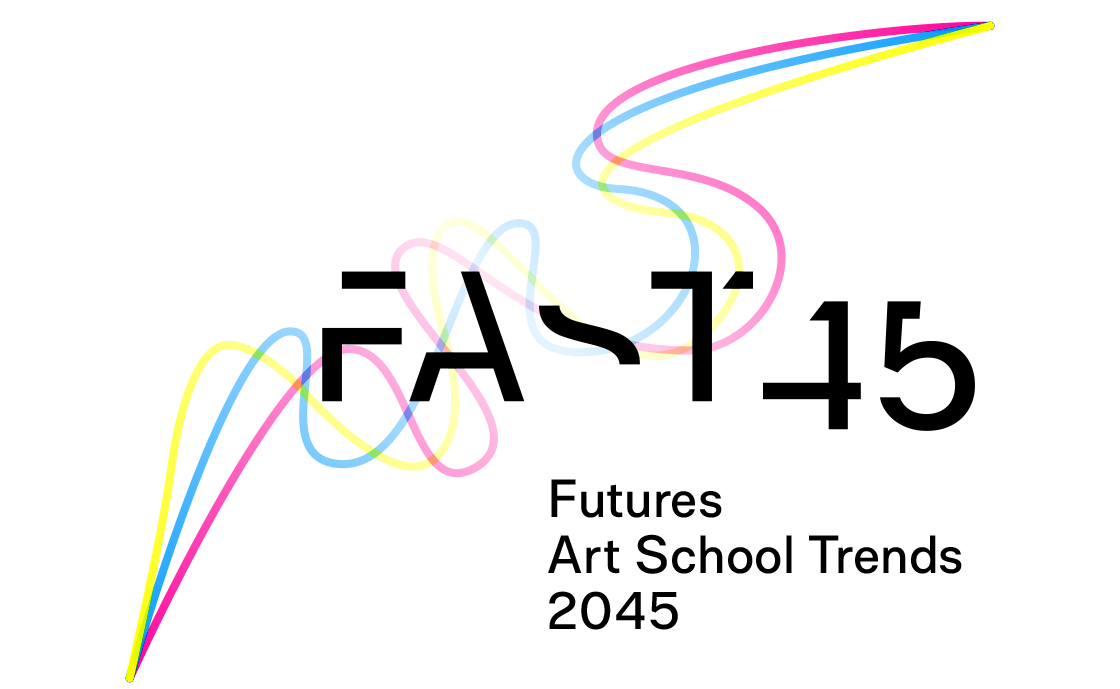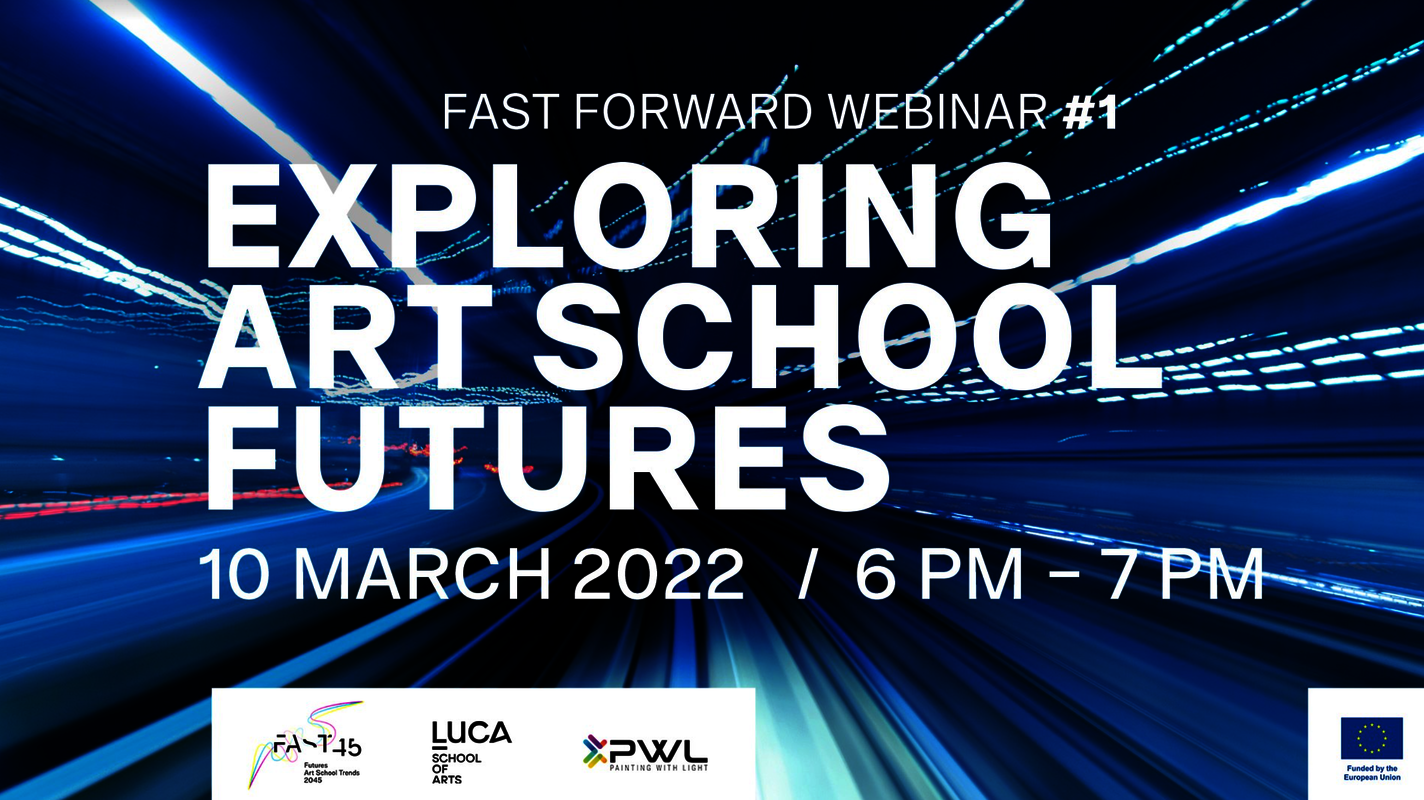Introduction
In 2045 the world as we know it will look very different. Although we cannot predict the future, we can shape it. FAST45 (Futures Art School Trends 2045) recognises the potential of the creativity and imaginative thinking nurtured and developed at art schools. Together with the drive for innovation in society at large, this has inspired key players from higher arts education and business to join forces. The aim is to imagine and promote a future in which the arts and arts education play an integral role in a world radically reshaped by the 4th industrial revolution, globalisation and climate change.
Aims & Objectives
Taking a futures studies approach, the FAST45 project aims to imagine, map and shape a higher arts education landscape where participation, research, and education in the arts play a crucial and integrated role within the sector and society as a whole.
FAST45 aims to collect knowledge, create and test new methodologies and implement them as part of Art School Futures Labs. Educators, researchers, students and business professionals together, are in the process of creating scenarios with the aim to operationalise them in policy papers, long-term collaborations and valuable tools that will empower arts institutions to not only anticipate an unknown future, but to actively shape it.
By working across sectoral boundaries and envisioning future scenarios for 2045, the Erasmus + Knowledge Alliance funded project FAST45 intends to achieve the following objectives:
- To explore and inventory already existing ideas and visions of possible, probable, or preferable futures for higher arts education (HAE) and the employment of artists.
- To organise Art School Futures Labs that enhance future thinking and imagine alternative futures inside HAE (staff and students) and outside HAE (external public and private partners).
- To deliver four alternative Art School Futures Scenarios that highlight the dissimilarities /distinction from the present and reveal the potential choices and their potential consequences that HAE needs to prepare for their longer-term future planning and decision-making.
- To organise a general discussion/debate on possible policy and decision actions that informs and facilitates transformative leadership for strategic steps forward.
FAST45 knowledge, methods and tools will create agency and sustainability for institutes of the arts and their stakeholders. The project duration is 3 years starting on January 1st (2021).
FAST45 is funded by the Erasmus + Knowledge Alliance programme of the European Union.
Our Involvement
On side of the Film University, Prof. Dr. Lena Gieseke is part of the steering committee of the project. Furthermore the Film University is mainly responsible for the first work package of the project.
Work Package 1
The first work package aims to set the scene for the FAST45 project with a systematic exploration and inventory of research-informed data of the status quo and currently anticipated futures.
The topics we consider are the roles and impact of artists in art, business, and society and how Institutes of Higher Arts Education can facilitate the best learning contexts for its future students. The outcome of WP1 lays the groundwork for revealing innovative roles, contexts, and utilization for artists and their unique skills for the development of desirable futures.
In the first work package of the project, so far we have conducted over 50 interviews with various stakeholders from different areas all over Europe. We talked with these stakeholders about impactful roles of artists, art, and creative work in their field of expertise, current challenges and drivers, and the most prominent trends and developments. We also discussed their utopias and dystopias for our world in 25 years. This in-depth qualitative interview data we have labeled with over 700 codes in the main categories of technology, arts educational practices, economy, sustainability, Institutes of Higher Arts Education, society, and politics. The labeled data enables us now to identify and analyze current practices, challenges, problems, and concrete future plans in each field. It is planned to publish the coded interview data in spring 2022 as Art School Futures Data Map. We furthermore contextualize our interview data with literature and influential online resources relevant to future thinking and publish a state-of-the-art bibliography.
Next to publishing the data itself, we are working on summarizing the collected information into meaningful, attractive, and easily accessible presentations - namely as interactive online narratives in a scrolly-telling format and creative video essays as parts of the Art School Futures Data Map. This content is furthermore curated into online classrooms that enable and inspire future thinking inside and outside IHAE by providing relevant information and creative triggers. Through the execution of the classrooms, we are continuously collecting new insights, which are fed back into our project work. We apply our classrooms as live webinars in March 2022 in a hybrid format. These webinars are open to all IHAE and their partners in Europe.
We hope that this research-informed approach supports us in posing and identifying relevant questions and defining clear criteria for investigating the futures of IHAE and the arts.
Our Team
Lea Minow, Marcel Bückner, Johanna Hartmann, Sylvia Rybak, Lena Gieseke
Partners
- LUCA School of Arts
- Estonian Academy of the Arts
- University of the Arts Helsinki
- Cefedem Auvergne Rhône-Alpes
- Film University Babelsberg KONRAD WOLF
- Technological University Dublin
- School of Commons (SoC), University of the Arts Zurich
- Microsoft Ireland
- Conexiones Improbables
- Xenorama Collective for Audio Visual Art
- ELIA
- Association des Conservatoires, Académies de Musique et Musikhochschulen (AEC)
Press & Communications Contact
Derville Quigley, ELIA Community Administrator, derville.quigley@elia-artschools.org






